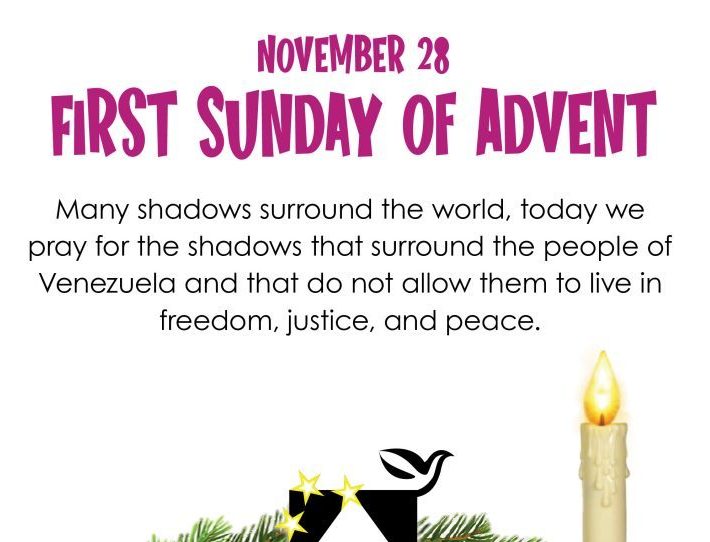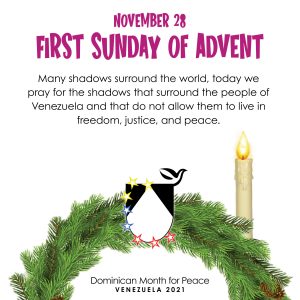
by Fr. Benjamín García Fernández, OP
Bible readings: Jer: 33:14–16, Ps: 24, 1 Thes 3:12– 4:2, Luke 21: 25-28, 34–36
 The liturgical year begins in Advent. The Latin word refers to “the one who comes”, who is the Messiah. The entire biblical Old Testament is the story of one hope. The prophet Jeremiah recalls on the first Sunday of Advent that the Messiah will be “our justice, because he will bring justice and right to the earth” (Jem, 33, 14–16).
The liturgical year begins in Advent. The Latin word refers to “the one who comes”, who is the Messiah. The entire biblical Old Testament is the story of one hope. The prophet Jeremiah recalls on the first Sunday of Advent that the Messiah will be “our justice, because he will bring justice and right to the earth” (Jem, 33, 14–16).
The Gospel of Luke (21, 25–28) describes in terms of anguish the situation of a society invaded by corruption, hunger and war. Natural cataclysms are signs of moral evil in Israel’s prophetic literature. But the situation of noise and maritime waves is not normal, nor will it be final. A Saviour will come, a Messiah who will liberate men who trust in him. The evangelist speaks to specific people and warns of specific dangers and sins: vice, alcoholism, desire for money, power misused. They are images that allude to people and peoples.
Christian hope overflows and hovers above human tragedies. The gospel that gathers the life and teachings of Jesus is optimistic. Cataclysms are not the end. The volcano that (October-2021) brings desolation and death to a Canary Island these days will not be a permanent evil. Vegetation and flowers will grow on the calcined rock. These grim images portray what is happening now in Venezuela. Here Human Rights are not respected. There is no separation of powers as is typical of democracies: here the political institutions dominate the legislative power and the judiciary. There is no transparency in the electoral processes. Despite the immense natural riches, the people are starving: six million Venezuelans have had to emigrate.
There is hope in the Venezuelan people. There is a living awareness of what is wrong. There are organizations (such as Justice and Peace, NGOs and others) that fight to rescue human values. There is memory: here there was evident progress, education was free. Good hospitals were built with specialist doctors. The roads and vehicles were accessible.
The shortest book in the Bible is the letter of Saint Paul to Philemon, it is key in terms of Human Rights. The Apostle reminds his friend “that he lost a slave, but recovers a brother.” The baptized are brothers. Relationships between siblings are one of justice, peace, coexistence, sharing goods and difficulties. Between brothers who love each other there is no corruption or exploitation. This is what the Justice and Peace institution promoted by the Dominican Order is about. —
The liturgical Advent renews hope in believers. The people will be his own Messiah, with the help from on high, since God “hears the supplications and sees the pain of his children.” He is fighting corruption and injustice. The reconstruction of Venezuela will come from the children who stay here fighting for democracy, for honesty for Justice and Peace.
Lighting of the Candle
Prayer:
Let us kindle, Lord, this light, as one who lights his lamp to go out, in the night, to meet the friend who is coming. In this first week of Advent we want to prepare ourselves to wait for you, to receive you with joy. Many shadows surround the world, today we pray for the shadows that surround the people of Venezuela and that do not allow them to live in freedom, justice and peace. We want to be awake and vigilant, because you bring the clearest light, the deepest peace and the truest justice. Come, Lord Jesus! Come, Lord Jesus!

